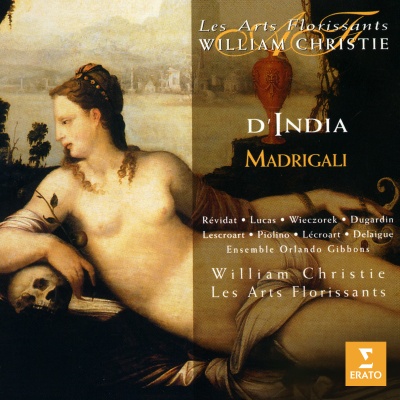
D'India: Madrigali
The Sicilian nobleman Sigismondo d'India was roughly contemporary with Monteverdi (both began their careers around 1600); the musical ferment of that period led, in d'India's case, to a very heady brew. His madrigals--duets, solos and five-voice works--are like inebriated Monteverdi: d'India set the Italian poetic texts (usually dealing with a lover's pain) with even less regard for academic counterpoint and even more surprising twists of harmony than did his more-famous colleague, yet the music never veers into the disorienting, seemingly willful weirdness of Gesualdo. William Christie and Les Arts Florissants have made occasional forays into the music of 17th-century Italy before, but their real turf is the French Baroque--and on this disc, it shows. The fast passagework is blurred; the vibrato (from the sopranos in particular), while not wide by modern operatic standards, is sufficient to smudge d'India's searing dissonances. Some of the solo singing is interesting and the ensemble and tuning are perfectly good, but this listener doesn't sense much passion. Oddly, several of the madrigals are played by an ensemble of viols. Performance by instruments rather than singers is historically plausible, but why use the famously sober viol family for such ardent music from the period when the violin family was just coming into its own? Les Arts Florissants certainly don't dishonor themselves here, but their work is far from the exalted standard they set in, say, Charpentier. If you want to know how dramatic d'India's music can be, let the Italian singers of Daltrocanto show you.
